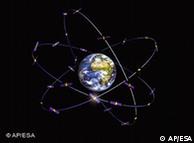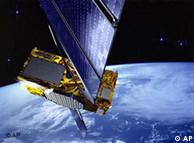Technology | 02.10.2007
Berlin Wants Bigger Share of Galileo for German Companies
Berlin has said it wants a larger role for German companies in the Galileo satellite navigation system as the EU debates how it will pay for the project, which has been plagued by delays and funding problems.
European Union transport ministers will discuss Galileo's future on Tuesday, Oct. 2, in a decision that could spell the beginning of the end of the high-technology venture touted as a rival to the US military's Global Positioning System (GPS).
Galileo, which was supposed to be a showcase for Europe's technical prowess and be in place by 2008, has stalled as cost overruns pile up, private contractors bicker and member states push their own industrial interests.
After funding from a private, international consortium of eight companies involved in creating the satellite navigation system fell through, the EU said it would pump some 2.4 billion euros ($3.3 billion) into the European space project.
 Bildunterschrift: Großansicht des Bildes mit der Bildunterschrift: Barrot has found few supporters for his funding model
Bildunterschrift: Großansicht des Bildes mit der Bildunterschrift: Barrot has found few supporters for his funding model
"I am still convinced that Europe needs Galileo," EU Transport Commissioner Jacques Barrot said on Sept. 19 when he announced a funding plan to save the project. "Galileo is very important for the strategic autonomy of Europe."
Barrot has suggested the bailout money come from the billions worth of unspent agricultural funds that are returned to national coffers each year.
Germany to bear brunt of costs
Barrot's proposal was initially given a tepid welcome by France, Belgium, Italy, Luxembourg and Spain. Germany, the EU's largest net contributor, is openly opposed to the plan.
"We cannot support the suggestions proposed by the EU Commission," German Transport Minister Wolfgang Tiefensee said Monday in an interview with Die Welt newspaper. "Germany will carry the main financial load. That's why the appropriate participation of German companies in Galileo's construction is a matter of course."
Tiefensee has received the support of his colleagues in the economic ministry, which is against tapping the bloc's agriculture budget for other projects.
"On its own, the suggestion is coherent, but if you look at the political framework, it becomes very difficult to implement," Deputy Economics Minister Joachim Wuermeling said Friday.
Time to decide?
 Bildunterschrift: Großansicht des Bildes mit der Bildunterschrift: With all the satellites circling the Earth, some wonder if the EU needs its own
Bildunterschrift: Großansicht des Bildes mit der Bildunterschrift: With all the satellites circling the Earth, some wonder if the EU needs its own
A breakthrough on Tuesday is not expected as both Britain and the Netherlands have also expressed their dissatisfaction with the EU juggling funds away from their intended purposes to pay for the satellite project.
Barrot has said if EU leaders couldn't reach an agreement by the end of the year, the 27-member bloc would be forced to decide if it was prepared to let the project crash before it ever lifts off.
While Europe has remained divided over Galileo, Russia and China have been working on similar satellite projects, and the United States is updating its GPS, already used widely in cars, boats and planes.

Comments